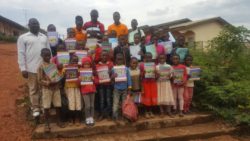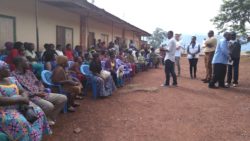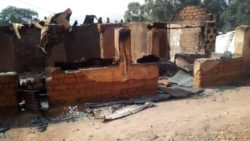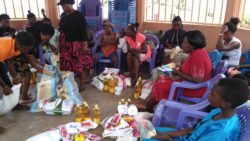A reality of Cameroon, the country fondly referred to as “Africa in miniature”, “the land of milk and honey”, the most peaceful country.
Camaroon English Speakers
 Former Southern Cameroon (Northwest & Southwest regions of Cameroon) is considered a minority group in Cameroon. Approximately 20% of the population (5 Million) of Cameroon are from and reside in these two English-speaking regions. This minority population has been marginalized both in public institutions and state positions. The feeling of marginalization started developing and growing among the anglophone population, when the 1961 Federal Constitution was changed by President Ahidjo in 1972; changing the status of Cameroon from the Federal Republic, to the United Republic of Cameroon. The sentiment started to develop among the anglophone population that the francophone population was better represented politically, economically and socially. This fueled claims of self-determination within the Anglophone population. (ICG 02/08/2017).
Former Southern Cameroon (Northwest & Southwest regions of Cameroon) is considered a minority group in Cameroon. Approximately 20% of the population (5 Million) of Cameroon are from and reside in these two English-speaking regions. This minority population has been marginalized both in public institutions and state positions. The feeling of marginalization started developing and growing among the anglophone population, when the 1961 Federal Constitution was changed by President Ahidjo in 1972; changing the status of Cameroon from the Federal Republic, to the United Republic of Cameroon. The sentiment started to develop among the anglophone population that the francophone population was better represented politically, economically and socially. This fueled claims of self-determination within the Anglophone population. (ICG 02/08/2017).
This feeling of marginalization has been justified over the past years, where official documents are mostly released only in French. There was infiltration of English common law system practiced in the English speaking parts of Cameroon and infiltration of the Anglo-Saxon system of education practiced in the English speaking regions of Cameroon with the French system of education. Worst of all, French speaking teachers who can barely say “good morning” in English, were sent to teach major subjects in Anglo-Saxon schools in the English speaking regions of Cameroon. This has made the Anglophone population feel that their culture and identity is being assimilated and wiped out.
 In 2016, Anglophone teachers and lawyers began a peaceful and non-violent protest against the increased use of the French language in English schools, the continuous deployment of incapable French speaking teachers with no English background to teach major courses in English schools, and the increased use of the French civil law and the French language in English courts. The Cameroonian government violently responded to the peaceful protest by lawyers and teachers, torturing a good number of them. In November 2016, there was another peaceful and non-violent protest by the population of the Northwest region precisely in the city of Bamenda against the poor construction of roads and lack of portable drinking water. The government again responded violently against the population, firing live bullets into the masses. As a result of this violent response from the government and with the violent crackdown on the University of Buea students, who were also protesting, leading to further discontent among the Anglophone population.
In 2016, Anglophone teachers and lawyers began a peaceful and non-violent protest against the increased use of the French language in English schools, the continuous deployment of incapable French speaking teachers with no English background to teach major courses in English schools, and the increased use of the French civil law and the French language in English courts. The Cameroonian government violently responded to the peaceful protest by lawyers and teachers, torturing a good number of them. In November 2016, there was another peaceful and non-violent protest by the population of the Northwest region precisely in the city of Bamenda against the poor construction of roads and lack of portable drinking water. The government again responded violently against the population, firing live bullets into the masses. As a result of this violent response from the government and with the violent crackdown on the University of Buea students, who were also protesting, leading to further discontent among the Anglophone population.
ESCALATING TENSIONS
Tensions then escalated within the two English speaking regions of Cameroon (Northwest and Southwest), giving rise to armed conflict between the Cameroon government and non-state armed groups of separatist fighters. (Center for the responsibility to protect 15/09/2018, CICAM 03/07/2018). On October 1st 2017, the secessionist group known as the Ambazonia Governing Council symbolically declared the independence of Southern Cameroon as the State of “Ambazonia”. (The Guardian Post 18/09/2018, The Center for the Responsibility to Protect 15/09/2018).
Since late 2016, the Anglophone regions of Cameroon have faced an insurrection which has intensified over time. Civilians are increasingly becoming targeted by both parties. There are lots of indiscriminate killings of civilians and burning of civilian properties by the Cameroon military. This has fueled large scale displacement as many people flee their homes and settlement areas into bushes and other cities, villages or neighboring Nigeria in search of refuge. (Amnesty International 18/09/2018). From August 2017 to August 2018, at least 400 civilian fatalities were recorded in anglophone Cameroon (Crisis Group 17/09/2018).

In the second quarter of 2018, the conflicted become more heated with over 239 civilian casualties, compared to a total of 425 people, including approximately 142 civilians killed since October 2016. About 260 security incidents were recorded in 2018 (Amnesty International 18/09/2018, ACLED, 22/07/2018). The separatist fighters whose target was the military, are increasing targeting civilians and civil servants. There are lots of kidnappings and killing of civilians by the separatist fighters. (ACLED 04/05/2018). Increased violence and insecurity in the English speaking regions of Cameroon has led to massive displacement of people both internally and externally to neighboring Nigeria. As of November 2018, 30,000 Cameroonian refugees were in Nigeria. (UNCHR). Since November 2017 till date, approximately 437,500 persons are internally displaced (104,000 in the Northwest and 246,000 in the Southwest, 85,000 in the Littoral and West regions). (OCHA 30/11/2018, IOM 16/08/2018).
As a result of the crisis, over 4 million people are affected, 1.3 million persons in need, and 437,500 internally displaced from their localities. Women and children constitute a majority of the IDPs (ocha 2018). Vulnerability is increasing, as many IDPs are more exposed to violations of their human rights: rape, poor healthcare, lack of shelter, poor sanitation, lack of portable water, poverty, hunger, etc. The humanitarian response provided so far does not meet up with the identified needs.
My Level of Intervention
To be able to assist IDPs to meet their needs, I founded a non-profit organization known as, ADVOCATES FOR EQUITY AND DEVELOPMENT (AED) in 2018. AED is aimed at: advocating for the emancipation of vulnerable persons and grass-roots communities, protecting the rights of said persons, empowering and educating them on attaining a sustainable lifestyle, and establishing welfare to improve community development.
Also in 2018, we organized a training program to empower and train IDPs, especially women and girls, on income generating skills in arts and crafts (producing handmade sandals with nylon twine, flower vase, table mats, jewelries, handbags, etc. all with beads). This training program is ongoing and is designed as a psycho-social therapy to help the IDPs get through their traumatic experiences as a result of the crisis. We have succeeded in training 20 IDPs with positive feedback. We hope to establish an empowerment center where we can reach out to and train many more vulnerable persons and IDPs.
We also support the IDPs by sending their kids to school and providing them with necessary books for their studies. Currently, we have sponsored 26 IDP kids in the primary education. We also, in collaboration with the St John the Baptist Parish Foncha Street, Nkwen-Bamenda, donated foodstuff to 400 IDPs.
 Reason for Intervening
Reason for Intervening
Helping the vulnerable in my community and contributing to the sustainable development of the community has always been my desire. Seeing people starve, without shelter, and in poor sanitary conditions due to crisis, is disheartening. I feel the urge to help the people of my community, because they are really suffering. They need assistance.
There are lots of gross human rights violation in the English speaking regions of Cameroon, where I come from. We need an immediate action to stop these violations and killings. Human lives matter.
- The Anglophone Crisis in Cameroon – by OTIA BINIKISEH N. Eric - April 7, 2019

 Reason for Intervening
Reason for Intervening
If you want any medical children help we can provide
Wow, this is so kind of you sir. We will need medical assistance for children. There are children who are displaced and due to the horrific conditions in which they live in, they have limited access to quality health care. Your offer is highly valued and appreciated sir.
Great work Mr.Eric keep sowing high with AED and always count on our support.
Thank you Mr Leo. I really do appreciate all your support and efforts to make vulnerable persons see meaning in life
Good job Eric.
Putting smiles on the faces of those affected by this crisis is a wonderful initiave.I’m proud of you.
We keep praying that the crisis comes to an end. A great man once said “The mentality of retaliation destroys states,while the mentality of tolerance builds nations”
Great write up Eric. Keep up the good work in assisting the IDPs.
Thanks Ancel. I believe if we work together as a community we would be able to build a better tomorrow. I pray God continues to give me the strength to continue to do what I’m trying to do
Wonderful analysis and insights. I am proud of you Mr. Otia. I am also proud to be a member of Advocates for Equity and Development. (AED)
Putting smiles on the faces of those affected by this crisis is a wonderful initiave.I’m proud of you.
We keep praying that the crisis comes to an end. A great man once said “The mentality of retaliation destroys states,while the mentality of tolerance builds nations”
Thank you Mr Bradley. Together as the AED team, we can and will effectively bring hope and put smiles on our brothers and sisters who have been victimised as a result of the ongoing crisis in our regions